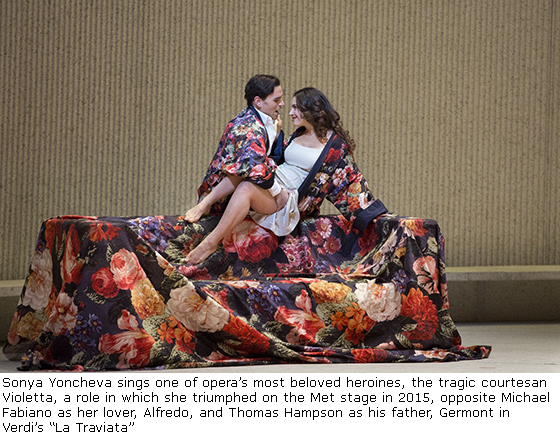 Mary D. Fisher Theatre is the home for the opera simulcast and encore events
Mary D. Fisher Theatre is the home for the opera simulcast and encore events
Sedona AZ (March 3, 2017) – The Sedona International Film Festival is proud to present the next Met Live Opera presentation of Giuseppe Verdi’s “La Traviata” on Saturday, March 11. There will be two shows that day at the Mary D. Fisher Theatre: 11 a.m. (live simulcast) and 4 p.m. (encore).
Plan to come early as John Steinbrunner will lead a pre-opera talk one hour before each production (10 a.m. for the morning show and 3 p.m. for the encore).
Sonya Yoncheva sings one of opera’s most beloved heroines, the tragic courtesan Violetta, a role in which she triumphed on the Met stage in 2015, opposite Michael Fabiano as her lover, Alfredo, and Thomas Hampson as his father, Germont. Carmen Giannattasio sings later performances of the title role opposite Atalla Ayan, with the great Plácido Domingo as Germont. Nicola Luisotti conducts.

Verdi’s “La Traviata” survived a notoriously unsuccessful opening night to become one of the best-loved operas in the repertoire. Following the larger-scale dramas of Rigoletto and Il Trovatore, its intimate scope and subject matter inspired the composer to create some of his most profound and heartfelt music. The title role of the “fallen woman” has captured the imaginations of audiences and performers alike with its inexhaustible vocal and dramatic possibilities—and challenges. Violetta is considered a pinnacle of the soprano repertoire.
Act I
Violetta Vale´ry knows that she will die soon, exhausted by her restless life as a courtesan. At a party she is introduced to Alfredo Germont, who has been fascinated by her for a long time. Rumor has it that he has been enquiring after her health every day. The guests are amused by this seemingly nai¨ve and emotional attitude, and they ask Alfredo to propose a toast. He celebrates true love, and Violetta responds in praise of free love. She is touched by his candid manner and honesty. Suddenly she feels faint, and the guests withdraw. Only Alfredo remains behind and declares his love. There is no place for such feelings in her life, Violetta replies. But she gives him a camellia, asking him to return when the flower has faded. He realizes this means he will see her again the following day. Alone, Violetta is torn by conflicting emotions—she doesn’t want to give up her way of life, but at the same time she feels that Alfredo has awakened her desire to be truly loved.
Act II
Violetta has chosen a life with Alfredo, and they enjoy their love in the country, far from society. When Alfredo discovers that this is only possible because Violetta has been selling her property, he immediately leaves for Paris to procure money. Violetta has received an invitation to a masked ball, but she no longer cares for such distractions. In Alfredo’s absence, his father, Giorgio Germont, pays her a visit. He demands that she separate from his son, as their relationship threatens his daughter’s impending marriage. But over the course of their conversation, Germont comes to realize that Violetta is not after his son’s money—she is a woman who loves unselfishly. He appeals to Violetta’s generosity of spirit and explains that, from a bourgeois point of view, her liaison with Alfredo has no future. Violetta’s resistance dwindles and she finally agrees to leave Alfredo forever. Only after her death shall he learn the truth about why she returned to her old life. She accepts the invitation to the ball and writes a goodbye letter to her lover. Alfredo returns, and while he is reading the letter, his father appears to console him. But all the memories of home and a happy family can’t prevent the furious and jealous Alfredo from seeking revenge for Violetta’s apparent betrayal.
At the masked ball, news has spread of Violetta and Alfredo’s separation. There are grotesque dance entertainments, ridiculing the duped lover. Meanwhile, Violetta and her new lover, Baron Douphol, have arrived. Alfredo and the baron battle at the gaming table and Alfredo wins a fortune: lucky at cards, unlucky in love. When everybody has withdrawn, Alfredo confronts Violetta, who claims to be truly in love with the baron. In his rage Alfredo calls the guests as witnesses and declares that he doesn’t owe Violetta anything. He throws his winnings at her. Giorgio Germont, who has witnessed the scene, rebukes his son for his behavior. The baron challenges his rival to a duel.
Act III
Violetta is dying. Her last remaining friend, Doctor Grenvil, knows that she has only a few more hours to live. Alfredo’s father has written to Violetta, informing her that his son was not injured in the duel. Full of remorse, Germont has told his son about Violetta’s sacrifice. Alfredo wants to rejoin her as soon as possible. Violetta is afraid that he might be too late. The sound of rampant celebrations are heard outside while Violetta is in mortal agony. But Alfredo does arrive and the reunion fills her with a final euphoria. Her energy and exuberant joy of life return. All sorrow and suffering seem to have left her—a final illusion, before death claims her.
The Met Live Opera’s “La Traviata” will be shown at the Mary D. Fisher Theatre on Saturday, March 11 at 11 a.m. (live simulcast) and 4 p.m. (encore). The pre-opera talks will take place one hour before each show. Tickets are $20 general admission, $18 for Film Festival members, and $15 for students. Tickets are available in advance at the Sedona International Film Festival office or by calling 928-282-1177. Both the theatre and film festival office are located at 2030 W. Hwy. 89A, in West Sedona. For more information, visit: www.SedonaFilmFestival.org.



